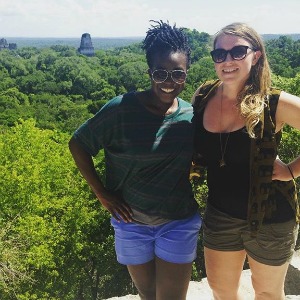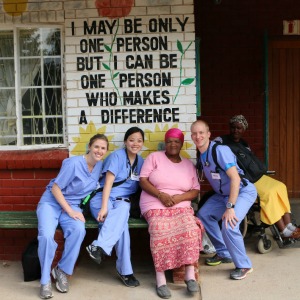Advanced Competency in Global Health
The Advanced Competency in Global Health aims to strengthen the medical knowledge and skills of our pediatric residents in addressing the health care needs of diverse populations, particularly those with limited resources, as well as help shape the values, and broaden the cultural understanding of our residents.
Goals
- Equip our residents with the medical knowledge and skills to address the health care needs of children of diverse populations, particularly those living in areas of the world with high morbidity and mortality and limited resources through participation in international and domestic elective experiences, didactic sessions, mentorship and research.
- Provide residents with dedicated mentorship in scholarly activities and career development.
- Develop residents who are well prepared to advance the care of vulnerable populations in their future careers as global pediatricians.
Objectives
Through participation in this program, residents will be able to:
- Demonstrate fundamental knowledge of the role of the Pediatrician as a Global Health practitioner.
- Demonstrate ability to deliver culturally sensitive care in under-resourced environments in the U.S and/or international settings.
- Demonstrate basic knowledge in the following: global indicators of disease, population health, maternal-child health, infectious and tropical diseases, managing the sick child and managing chronic disease in resource limited settings, local global health.
- Present key findings of one’s personal experience in delivering care to an underserved population in the U.S. and/or international setting
- Reflect on their elective participation and knowledge gained through the competency and construct action steps for further work in Global Health/Underserved Population Health as part of future career plans.
Assessments
- Self-assessment in Global Health competencies at beginning and end of program
- Certificate of completion of their “Global health Passport”
- Completion of Helping Babies Breathe Training Session
- Participation/attendance in at least 75% of monthly journal clubs/special events
- Complete a Global Health/Underserved Population Health clinical experience
- Presentation of elective experience to residents and faculty
- Completion of scholarly project
- Presentation of scholarly work at a Global Health Journal Club, the Global Health/Advocacy Symposium, Grand Rounds, or other academic forum (present at least one time during the 2-year program)
Learning Methods
- Online modules (see Global Health Passport)
- Annual NCH Global Health Boot Camp/Retreat
- Global Health Journal Club meetings and other monthly special events
- Experiential learning through Global Health/Underserved Population Health clinical elective and scholarly project
Program Requirements
Commitment:
- Must apply and be accepted to the program
- 24 month program unless prior approval given
Mentoring:
- Advanced Competency Program Directors (ACPD) assigns each resident a NCH Faculty mentor who shares their interest / experiences in specific areas and / or regions of global health
- Resident meets quarterly with NCH Faculty mentor, either in group or in 1:1 setting
- Conduct annual review with ACPD
Work Product:
- Oral presentation at Global Health Journal Club, Grand Rounds, annual Global Health-Advocacy Symposium or another academic platform
- Logged didactics/reading time (minimum 30 hours) on the Global Health Passport (reviewed with faculty member)
- International/U.S. Underserved Population elective with presentation about experience upon return or draft manuscript on approved research project (ideally submitted for publication prior to completion of residency)
Program Faculty
- Co-Directors:
- Cara Harasaki, MD
- Nicole O’Brien, MD
Resident Testimonials
The most fulfilling and memorable experience of residency was my international rotation facilitated through the Global Health Certificate Program. I had the opportunity to travel to northern Guatemala’s Peten region with a fellow resident to work in a district tertiary hospital in the city of Flores. At the hospital we worked in their ICU where we witnessed the local physicians troubleshooting how to appropriately care for critically ill children and infants in a resource limited setting.
At one point the hospital ran out of functioning ventilators, requiring 2 infants to be hand bagged for approximately 12 hours. We were able to review the ICUs data and discovered a mortality rate of 33% (compared to the national average of 22%) of admissions sparking a discussion of most common causes of death and ways the hospital could improve to decrease that number. At the time of our departure, we had brainstormed ways to decrease risk of infection, issues with delayed neonatal resuscitation, and started to gather materials for the hospitals first pediatric code cart. In addition to the hospital work, we spent some time conducting community clinics (5 total in the month) with approximately 100 children at each, where we treated common pediatric ailments, followed up with a patient with undertreated and severe asthma, and developed an intervention plan for a child with severe developmental delay.
One afternoon we held a session with local midwives in the villages on the basics of neonatal resuscitation and supplied ventilation bags. This experience traveling to Guatemala and working in a resource limited regional hospital for a month provided exposure to interesting and diverse diagnoses and a further understanding of healthcare on a global scale.

The residency program at Nationwide Children’s has excellent global health opportunities and resources. I was able to travel to Missionvale, South Africa with two of my co-residents for an entire month and spend time working in a clinic serving the underprivileged.
This was a WONDERFUL opportunity and ideal global health site for residents. We were allowed a great deal of autonomy and performed a variety of procedures (I&D, all suturing, burn debriding and treatment, cyst removal, FNA biopsy, and joint injections to name a few). On Tuesdays, physician volunteers joined caregivers (women who are not medically trained but taught to take BP with a machine and check blood sugar) on home visits of patients to check on them and see if anyone needed a referral to see a doctor in clinic. This was an eye opening experience and a great opportunity to teach this team that is the front line of medicine for many patients. On Thursdays we helped at a women’s clinic doing routine cervical screening and HIV testing.
Missionvale itself is a township of over 30,000 people - all without running water and many without electricity. The people and the patients are amazing. They were all very excited to receive medical treatment from a doctor. Many speak English, although some speak Afrikaans or Xhosa, but the staff at the clinic can function as interpreters. The clinic is very well organized and helps a great deal of people.
I felt well prepared for my international rotation from my involvement with the Global Health Curriculum run by Dr. Nicole O’Brien where we had simulation sessions to learn how to handle situations with resources and circumstances you might encounter in developing countries. We also had a fun journal club that always involved great discussion about recent global health articles and heard about recent trips and experiences from other residents. This opportunity was also supported by a hospital-supplied funding through the International Travel Grant, which I really appreciated!

Working at Kijabe Hospital was a very unique and powerful experience. Although it is a rural Kenyan hospital it is also a large referral hospital with a brand new dedicated pediatrics hospital. All practitioners (physicians and mid-levels, alike) are very knowledgeable and work to implement Evidence Based Medicine as much as possible without the resources to which we are accustomed. I had a significant amount of autonomy, including sole management of a very sick 7 year old with multi-organ failure and DIC on a ventilator. I had to rely on my core knowledge of pathophysiology and physical exam skills because we had run out of blood gas cartridges. At the same time, I was also comfortable knowing that I could reach out to the more experienced Pediatricians if needed.
I was not only involved in patient care, but also education of the next generation of Kenyan physicians. Much of the day was dedicated to teaching Kenyan interns, which was very powerful because they receive only 3 months of pediatrics training before being assigned to be the solitary medical officer at a remote clinic. I felt the biggest impact I had was teaching them the core basics of NRP when we responded to emergent c-sections and meconium aspirations multiple times a night. Given my future goals of pursuing a career in global health, Kijabe not only provided me a location to hone my clinical skills in a resource poor arena and be part of the empowerment of local healthcare providers, but also make meaningful connections with patients, family, and others dedicated to global healthcare. I was particularly grateful for the support of our Global Health program who put me in touch with Kijabe and supported my travels with multiple funding/grant opportunities without which the trip might not have been possible!

